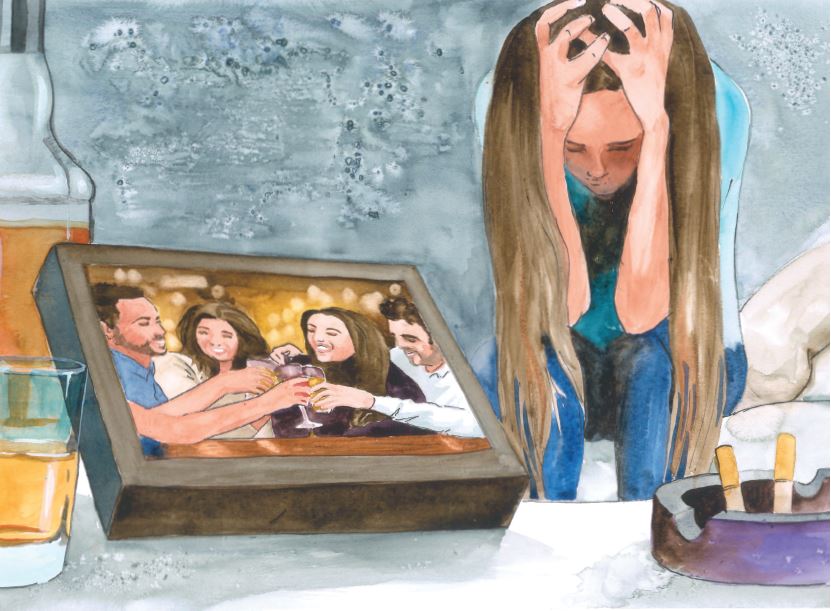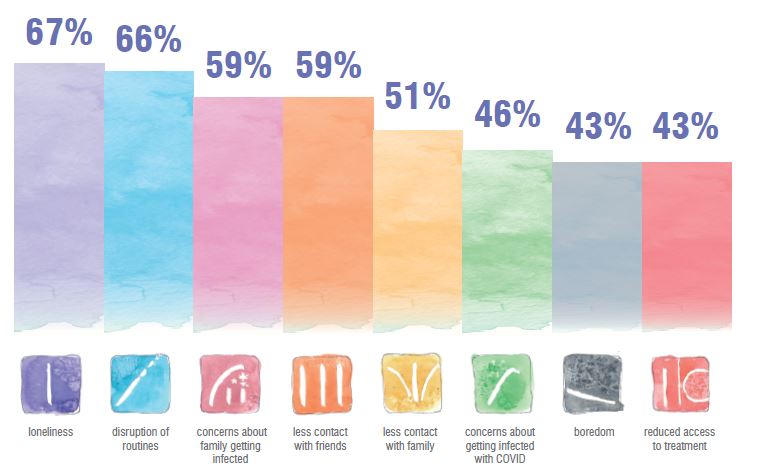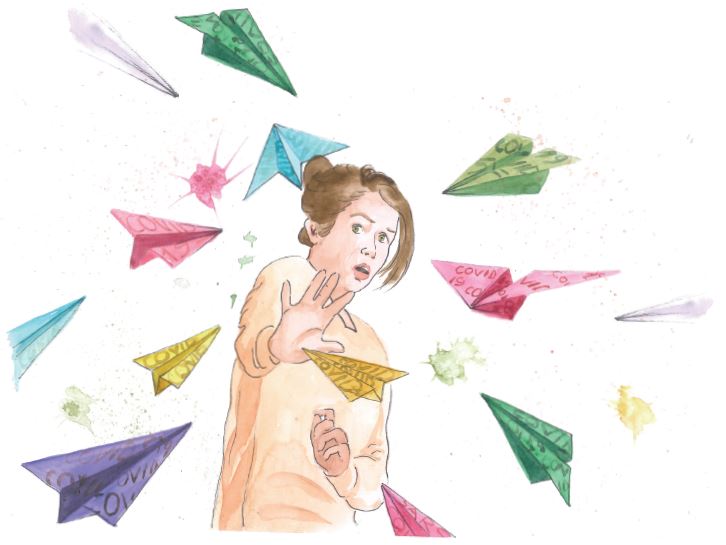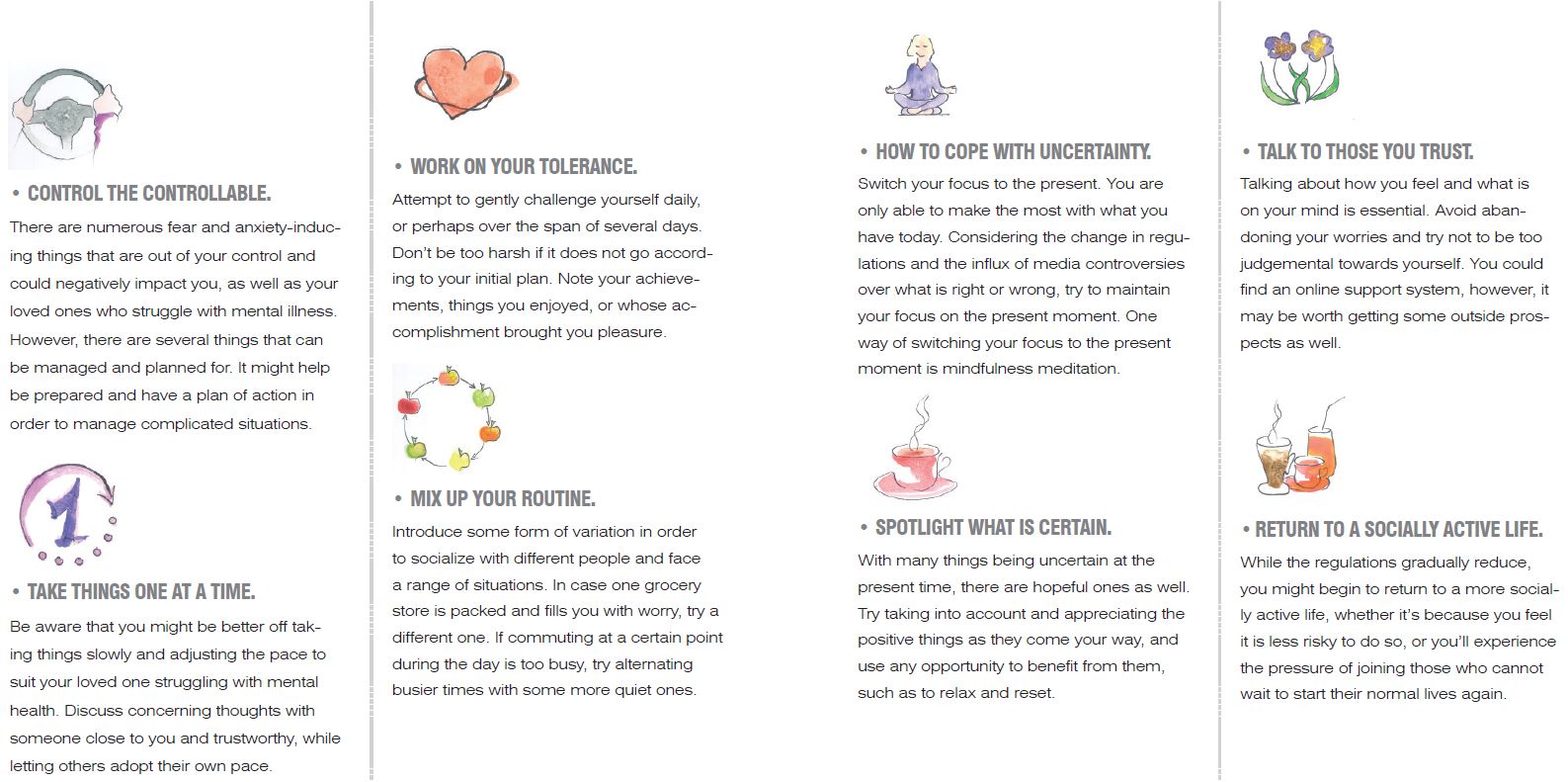
Schizophrenia management in the aftermath of
the COVID-19 pandemic
In this section
A short history of the pandemic
At the end of DECEMBER 2019, the World Health Organization was alerted by Chinese
authorities about a considerable amount of pneumonia cases with an undetermined cause in China’s Wuhan city of Hubei province. On JANUARY 5TH, 2020, the cause of the mystery disease was identified as a new strain of coronavirus. In the following weeks, the virus spread to an increasing number of countries around the world.
On FEBRUARY 11TH, 2020, the virus was named “severe acute respiratory syndrome coronavirus 2” (SARS-CoV-2), while the disease it produced was labelled as “coronavirus disease 2019” (COVID-19).
On MARCH 11TH, 2020, the World Health Organization proclaimed the COVID-19 outbreak to be a global pandemic.
The most significant aspects of the current pandemic could be left behind in terms of affecting the health of the population and social constraints. The transition period could be a time of great challenges and difficulties for patients with pre-existing chronic diseases, including those suffering from mental illness.
The impact of COVID-19
The pandemic has NEGATIVELY IMPACTED THE LIVES OF HUNDREDS OF MILLIONS OF PEOPLE and has had a devastating effect on many aspects of our lives including the economy, employment, education, mobility, and family tradition. In most countries, it has stretched healthcare systems to their limit and has created long-lasting social, economic, and political crises. It has also changed the way we work and interact with other people. But more importantly, aspects like the chance of coming into contact and falling ill with COVID-19, the regulations aimed at reducing the spread of the virus, such as following lockdown rules, respecting social distancing, and self-isolating, have resulted in increased societal stress, affecting our mental health.
In the course of the pandemic, there was a significant increase in the number of adults reporting symptoms of anxiety and depression in the U.S., this figure jumping from 1 to 4 out of 10 adults compared to pre-outbreak. Also, many adults reported certain ADVERSE EFFECTS THAT TOOK A TOLL ON THEIR MENTAL AND PHYSICAL WELLBEING,
these including disrupted eating and sleeping patterns. They also reported engaging in the misuse of alcohol and drugs, alongside experiencing aggravated chronic conditions caused by coronavirus-induced stress and anxieties.
The coronavirus also had a major impact on family dynamics. Lockdowns and working from home resulted in more interpersonal tensions in crowded living conditions. Previous conflicts or difficult interactions intensified as there was less space for individual family members to retreat.
How has coronavirus affected people with schizophrenia?
The COVID-19 pandemic has rewritten the lives of people with schizophrenia and of those who take care of them. Additionally, it has generated NEW CHALLENGES for those already struggling with mental illnesses.
In a study assessing the impact related to mental health that the pandemic has had on individuals with mental illnesses over half of participants reported the pandemic lockdown has caused their mental health to worsen. The most frequently indicated factors to cause this deterioration were:
People with schizophrenia are amongst the most vulnerable members of society, often being predisposed to homelessness, diseases, substance use, and lower socioeconomic status. As a result, they have several risk factors that MAKE THEM MORE SUSCEPTIBLE TO COVID-19.
The presence of other diseases (comorbidities) for example, is known to RAISE THE RATES OF MORTALITY IN INDIVIDUALS ILL WITH COVID-19. Over 70% of people with schizophrenia suffer from one or multiple comorbidities, such as type 2 diabetes, respiratory diseases, and heart diseases. Because of this, the average lifespan of someone living with schizophrenia is 15 YEARS shorter in comparison to a person without the disorder.
Furthermore, in case of hospitalization with a respiratory condition, their admission rates to intensive care units are higher, as well as the need for mechanical ventilation. Also, the chance of respiratory failure and in hospital death, as opposed to other patients, is higher, too. On the whole, the majority of people with schizophrenia belong to at least one known risk group and, if hospitalized, have an increased risk of worse clinical outcomes because of COVID-19. In fact, INDIVIDUALS WITH SCHIZOPHRENIA HAVE DOUBLE THE SUSCEPTIBILITY OF BEING HOSPITALIZED WITH COVID-19 as those not ill with the disorder, and according to a new study, they are three times more likely to die from the virus.
This higher risk cannot be explained by the presence of heart disease, diabetes, or smoking, factors that usually shorten the life of people with schizophrenia.
The findings from the study indicate that the vulnerability of those with schizophrenia to viral infections such as COVID-19 may be related to the disorder’s own biology.
A possible reason for that could be the derangement of the immune system, seemingly linked to the disorder’s genetics.
The cognitive dysfunction associated with schizophrenia also increases the risk of infection. People with schizophrenia MAY HAVE MORE DIFFICULTY FOLLOWING RESTRICTIONS, QUARANTINE PROCEDURES, AND ADEQUATE HYGIENE PRACTICES THAN THE GENERAL POPULATION. Flawed judgement together with inadequate self-care, two frequent characteristics of schizophrenia, might also interfere with the conformity to health recommendations and lead to putting themselves, their family members, and health care professionals in danger.
Furthermore, the pandemic is likely to have had an indirect effect on people with schizophrenia by INCREASING THE RISK OF A RELAPSE. Generally, one of the most important measures in trying to limit the spread of the virus is social isolation, which can cause substantial emotional distress to people with schizophrenia, as well as to their caregivers. The stress caused by the outbreak, coupled with reduced accessibility to community-based care as well as the chance for impaired medication compliance, could increase the chance of a relapse. Alterations in the daily routine, anxieties from extensive confinement, the concern with coming into contact with the disease, or the loss of a family member due to COVID-19 could also act as IMPORTANT TRIGGERS.
We still do not know how the longterm effects of COVID-19 (the so-called “post-COVID syndrome”) interfere with the natural course of schizophrenia.
However, some of these effects, such as sleep disturbances, mood and anxiety problems, or symptoms similar to posttraumatic stress disorder (PTSD), could have major negative consequences and may affect your loved one’s quality of life.
The pandemic has also changed the day to day lives of people with schizophrenia by providing “ammunition” for their delusions. One of the characteristics of schizophrenia
is that it is always seeking new targets, new pieces of information that can become the
subject of delusions. Usually, these can be anything, from current politics to UFO sightings.
From the beginning of 2020, the new coronavirus and the COVID-19 pandemic have become the most popular topic in the media and conversations around the world.
The many unknowns about the virus and the disease it causes have led to A STATE OF UNCERTAINTY EVEN AMONG THE HEALTHY POPULATION; people with schizophrenia are even more sensitive to these issues.
Thus, for people with schizophrenia, every COVID-related information, from restrictions to political issues, has the potential not only to TRIGGER DELUSIONS, but also to affect their ATTITUDE TOWARDS SAFETY MEASURES, TREATMENT, AND VACCINATION.
As a caregiver, you have an extremely important role in the management of these delicate situations because you are the only person who can handle the problems related to the misinterpretations of COVID-related news and your loved one’s potential lack of insight regarding COVID-related health problems or prevention and treatment strategies. One of the most important issues in this regard is the widespread presence of FALSE INFORMATION AND CONSPIRACY THEORIES about almost every aspect of the pandemic, from the origin of the virus to the efficiency of face masks and the safety of vaccines.
As the connection between your loved one and the outside world, you are the one who can protect them from the harmful effect of COVID-related misinformation, which can lead to symptoms worsening or even relapse. The most up-to-date information is usually found on the website of the European Centre for Disease Prevention and Control, as well as the websites of national health ministries, national departments of public health, and national coronavirus task forces.
The termination of Covid-19 preventive measures: a guide on how to take care of yourself and someone suffering from mental illness.
While the COVID-19 preventive measures were found to be difficult when first introduced, we might find their withdrawal just as challenging. Even if our society has gone back to how it was before the pandemic, you and the one you are taking care of MIGHT NOT FEEL READY TO RECONVENE WITH THE ACTIVITIES you partook in before, like watching movies at a cinema, having drinks in a pub, joining larger groups of people or commuting by public transport.
With restrictions coming to an end, you and your loved one might experience the added pressure to join in, this fact potentially accompanied by the concern of others not having the legal requirement to enter selfisolation in case of being ill with COVID-19.
Similar to how finding ways to cope in the course of the pandemic took time, it is as
likely that IT WILL ALSO TAKE TIME from now on to habituate and go back to our usual
lifestyles. Try not to be too harsh on yourself if you notice this takes you a longer time
than anticipated or if you find others to be more self-asserted and sociable. PATIENTS
WITH MENTAL ILLNESSES MAY BE MORE SENSITIVE DURING THIS DIFFICULT TIME.
Some of the following mental health-related suggestions, such as introducing and upkeeping a routine, maintaining a socially active lifestyle, nourishing yourself with healthy food and exercising are just as relevant now as they were at the beginning of the lockdown.
In fact, they might apply even more in the following period as we might face sizable changes.
Fear and anxiety
The termination of the COVID-19 preventive measures might result in some common emotional responses, such as FEAR AND ANXIETY. Both you and the ones close to you might feel unsafe or unprepared to break free from your coping ways with the COVID-19 regulations as you are moving from several lockdowns towards the progressive ease and the end of regulations.
Paying attention to and making room for your feelings is HIGHLY IMPORTANT, as opposed to overlooking or ignoring them. It is by gradually increasing our tolerance that we can overcome these fears.
It could feel awkward at first to reconnect with people. Be it the uncomfortableness of being without a mask or feeling cautious about people being in big groups, it is essential that you do not rush the process and give yourself as much time as you feel necessary. If you are self-isolating or part of a high-risk group, you might experience alienation due to seeing everyone else engage in the activities that you miss. There might be a high prospect that people closest to you, such as family and friends, might be less likely to relate to and support you. It might be worth trying to reach out to those who can relate to your situation, or – if you are comfortable with it – speak to someone trustworthy about how it makes you feel when you are left out.
Maybe even suggest some possible ways of being included that do not necessarily involve being in physical proximity.
Keep in touch with support groups and see what their experiences and recommendations are in this regard.
Encourage your loved one to spend as much time outside as possible and to socialize with friends and family members as often as possible.
Follow the health care professionals’ advice and carefully monitor your loved one’s symptoms in order to identify possible worsening.
Do not forget to take care of yourself and your well-being and help the person you are caring for to get through this unusual period.
References
- Zhand N, Joober R. Implications of the COVID-19 pandemic for patients with schizophrenia spectrum disorders: narrative review. BJPsych Open. 2021 Jan 12;7(1): e35.
- Öngür D, Perlis R, Goff D. Psychiatry and COVID-19. JAMA. 2020 Sep 22;324(12):1159.
- Panchal N, Kamal R, 2021. The Implications of COVID-19 for Mental Health and Substance Use [Internet]. KFF. 2021 [cited 2021 Jul 2].
- Kølbæk P, Jefsen OH, Speed M, Østergaard SD. Mental health of patients with mental illness during the COVID-19 pandemic lockdown: A questionnaire-based survey weighted for attrition. medRxiv. 2021 Mar 20;2021.03.13.21253363.
- Zhou F, Yu T, Du R, Fan G, Liu Y, Liu Z, et al. Clinical course and risk factors for mortality of adult inpatients with COVID-19 in Wuhan, China: a retrospective cohort study. The Lancet. 2020 Mar 28;395(10229):1054–62.
- . Mohan M, Perry BI, Saravanan P and Singh SP COVID-19 in People With Schizophrenia: Potential Mechanisms Linking Schizophrenia to Poor Prognosis. 2021. Front. Psychiatry 12:666067. doi: 10.3389/fpsyt.2021.666067
- Manchia M, et. al. The impact of the prolonged COVID-19 pandemic on stress resilience and mental health: A critical review across waves. 2021. DOI: 10.1016/j.euroneuro.2021.10.864
SCHIZOPHRENIA: MYTHS vs TRUTHS
You might already have some preconceptions about schizophrenia, but do you know the myths from the truths? Explore common myths about schizophrenia and the trut
more…SLEEP YOURSELF HEALTHY
During the brain’s activity when we are awake, potentially toxic waste products are produced and accumulated in the brain. For healthy brain functioning and men
more…




